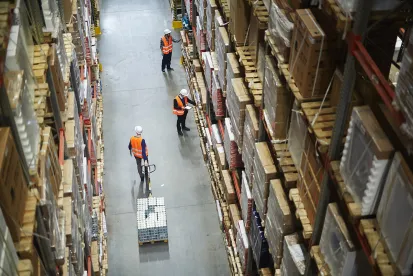Highlights
The COVID-19 pandemic and geopolitical tensions have exposed vulnerabilities in global supply chains, emphasizing the need for more resilient and sustainable systems that contribute to strong ESG performance
Countries worldwide are enacting supply chain disclosure and due diligence requirements for ESG factors with a focus on environmental disclosures and human rights protection
To enhance supply chain resilience, sustainability and ESG performance, companies are increasingly adopting strategies to reduce environmental impact, improve labor rights and ensure fair sourcing practices
In today's globalized economy, companies rely on complex supply chains that span multiple countries and industries. The COVID-19 pandemic and conflict in Ukraine, among other global economic events, have exposed vulnerabilities in these supply chains, leading to disruptions and highlighting the importance of building more resilient and sustainable systems.
Resilience and sustainability in supply chains also play critical roles in Environmental, Social and Governance (ESG) performance – particularly as more countries enact supply chain disclosure and due diligence requirements for ESG factors. One of the major focal points has been supply chain greenhouse gas emissions disclosures.
There also is growing international support for human rights protection, which has had a significant impact on supply chain diligence and taken on higher priority as an indicator of the social and governance aspects of ESG performance. On Jan. 1, 2023, Germany’s Supply Chain Due Diligence Act (LkSG) went into effect, requiring covered companies (domestic and foreign) to undertake due diligence of supply chains regarding human rights, including the prohibition of forced labor and slavery. The LkSG also requires companies to undertake diligence on other ESG factors and establish a risk management system for human rights, social, and environmental issues.
In addition to Germany, requirements for supply chain environmental and/or social due diligence are in place in France, the Netherlands, Norway and Japan and are included in the European Commission’s proposed Corporate Sustainability Due Diligence Directive.
In the U.S., the Uyghur Forced Labor Prevention Act (UFLPA) was enacted in 2022. The UFLPA prohibits import of goods into the U.S. made with the forced labor of Uyghurs and other minority groups in China’s Xinjiang Uyghur Autonomous Region. The UFLPA also applies to other goods produced by entities identified by an interagency Task Force, regardless of where they are produced.
The US-Mexico-Canada Agreement also provides for enforcement of laws regarding forced and child labor. Human rights protections have also been promulgated in the UK and Australia, and Canada is likely to enact a similar law this year.
To bolster resilience and sustainability in supply chains while enhancing ESG performance, companies are increasingly concentrating their efforts on reducing environmental impact, improving labor rights, and ensuring fair sourcing practices. Set forth below are a range of strategies and initiatives businesses can consider implementing to drive positive change in these areas and foster more responsible, transparent and sustainable supply chain management.
Environmental Impact
Reducing the environmental impact of supply chains is crucial for achieving long-term sustainability. Companies are adopting a variety of strategies to minimize their ecological footprint, including:
-
Resource Efficiency: Companies are working with suppliers to improve resource efficiency, including reducing energy and water consumption, minimizing waste and optimizing transportation and logistics. These initiatives can reduce the environmental impact of supply chains and cut operating costs.
-
Sustainable Materials: The choice of materials plays a significant role in determining the environmental impact of products. Companies are increasingly seeking sustainable alternatives to traditional materials, such as recycled or bio-based materials, to minimize their ecological footprint.
-
Renewable Energy: Companies are encouraging suppliers to transition to renewable energy sources, such as solar or wind power, to reduce greenhouse gas emissions and mitigate climate change risks. This shift can also enhance the resilience of supply chains by reducing reliance on fossil fuels and their price volatility.
-
Life Cycle Assessment (LCA): Companies can use LCA tools to assess the environmental impact of their products throughout their life cycles, from raw material extraction to disposal. This information can help identify areas for improvement and inform decision-making regarding material selection, manufacturing processes and end-of-life management.
-
Supplier Environmental Management Systems: Encouraging suppliers to implement Supplier Environmental Management Systems (EMS), such as ISO 14001, can help reduce environmental risks in the supply chain. EMS provides a structured approach to managing environmental performance and helps suppliers set and achieve environmental goals.
-
Carbon Offsetting and Insetting: Companies can invest in carbon offset projects to mitigate their supply chain emissions, or they can engage in carbon insetting, which involves investing in projects that reduce emissions within the supply chain itself. These initiatives can help companies achieve their sustainability goals and demonstrate their commitment to climate action.
Labor Rights
Companies are increasingly recognizing the importance of safeguarding labor rights in their supply chains. By ensuring fair working conditions, companies can not only minimize disruptions caused by labor disputes but also enhance their reputation and meet the expectations of ethical consumers and investors. Key initiatives to address labor rights include:
-
Supplier Code of Conduct: Companies are developing and enforcing codes of conduct for suppliers that outline expectations for labor practices, including fair wages, working hours and health and safety standards. By requiring suppliers to adhere to these guidelines, companies can promote ethical labor practices throughout their supply chains.
-
Auditing and Monitoring: Regular audits and monitoring of suppliers' labor practices are essential to ensure compliance with codes of conduct. Third-party auditors can help identify non-compliance and suggest corrective actions, while ongoing monitoring can ensure that improvements are maintained over time.
-
Capacity Building and Training: Companies are investing in capacity building and training programs for suppliers to help them understand and implement best practices in labor rights. This support can help suppliers improve working conditions, comply with regulations and minimize risks associated with labor disputes.
-
Robust Due Diligence and Risk Assessment: Companies can implement robust due diligence processes to identify and assess the risk of slavery and human trafficking in their supply chains. By understanding the risks associated with specific industries, regions and suppliers, companies can prioritize resources and develop targeted strategies to address these issues effectively.
-
Grievance Mechanisms and Whistleblower Protection: Establishing effective grievance mechanisms for workers in the supply chain can help identify labor rights violations and empower workers to report issues without fear of retaliation. Whistleblower protection policies can also encourage employees and suppliers to report violations, leading to better transparency and accountability.
-
Leveraging Technology for Worker Welfare: Companies can harness digital technologies, such as mobile apps and online platforms, to improve communication with workers, facilitate access to information on labor rights, and provide channels for reporting grievances or violations. These technologies can help bridge gaps between companies, suppliers, and workers, promoting transparency and enabling more proactive management of labor rights issues in supply chains.
Fair Sourcing Practices
Promoting fair sourcing practices is essential to ensure that supply chains are not only sustainable but also equitable. By sourcing responsibly, companies can support local communities, protect the environment and adhere to ethical standards. Key initiatives to promote fair sourcing practices include:
-
Fair Trade Certification: Companies are increasingly sourcing products that carry fair trade certification, which ensures that producers receive fair prices and that social and environmental standards are met. By choosing certified products, companies can support responsible sourcing practices and foster sustainable development in supplier communities.
-
Local Sourcing: By sourcing locally, companies can reduce transportation emissions, support local economies, and gain better visibility into their supply chains. This approach can also improve resilience by reducing dependence on distant suppliers and minimizing risks associated with global trade disruptions.
-
Supplier Diversity: Companies are focusing on supplier diversity to promote equity and inclusivity in their supply chains. By partnering with minority-owned, women-owned or other underrepresented suppliers, companies can foster economic empowerment and create more inclusive and resilient supply chains.
-
Traceability and Transparency: Implementing traceability systems, such as blockchain technology or product tagging, can help companies gain better visibility into their supply chains and ensure responsible sourcing practices. Transparency initiatives, such as public disclosure of supplier information and third-party audits, can also enhance accountability and build trust among stakeholders.
-
Collaboration With Industry Peers: Companies can join industry-specific initiatives and collaborate with their peers to address common sustainability challenges in their supply chains. These collaborations can facilitate knowledge sharing, drive collective action, and promote industry-wide improvements in labor rights, environmental impact and fair sourcing practices.
-
Integration of Fair Sourcing Criteria in Procurement Policies: Companies can revise their procurement policies to include specific criteria for fair sourcing practices, such as evaluating suppliers based on their labor rights, environmental impact, and social performance. By integrating these criteria into procurement decisions, companies can incentivize suppliers to adopt responsible practices and gradually improve the overall sustainability of their supply chains.
Takeaways
The COVID-19 pandemic and geopolitical conflicts have underscored the importance of building resilient and sustainable supply chains. The urgency is being driven by the global proliferation of ESG disclosure requirements for supply chains and growing international support for protection of human rights. By addressing labor rights, environmental impact and fair sourcing practices, companies can decrease disruptions and improve ESG performance and be better equipped to adapt, innovate and improve their competitive advantage, comply with regulatory requirements, meet stakeholder expectations, and contribute to the global goals of sustainability and social responsibility.




 />i
/>i

